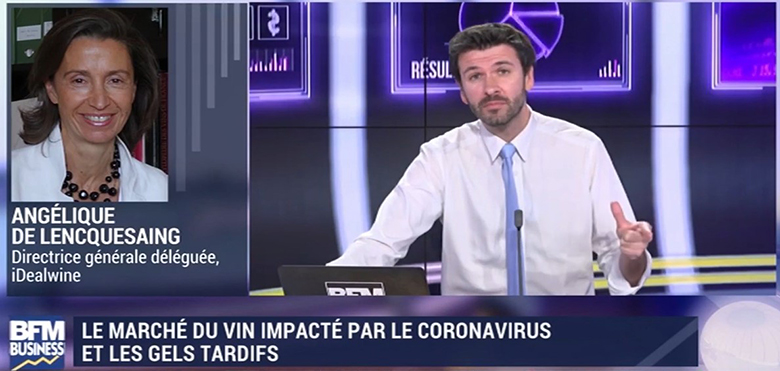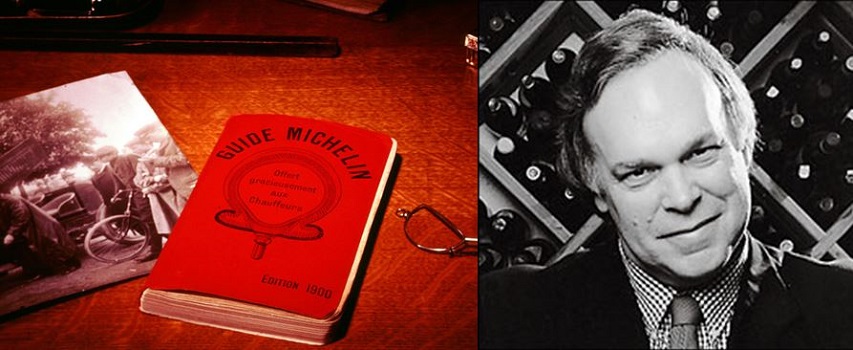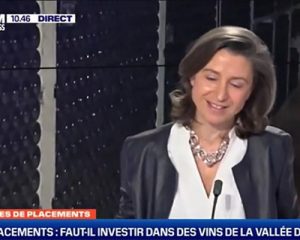
After a few weeks already spent in confinement, certain trends are emerging. Angélique de Lencquesaing analysed the effects of the crisis on the BFM Business channel with Guillaume Sommerer.
This current situation is extremely precarious for many economic stakeholders. What are you hearing from the vineyards?
It’s true that wine makers are having a hard time. In commercial terms, the interruption of the entire catering and hospitality industry has had immediate consequences on their sales. To add to their woes, many wine shows have been cancelled, worsening the situation for domains who sell primarily through these means. There has been no way to present their latest vintage. For wines that are sensitive to the season, such as rosés, stocks are building.
I want to take this chance to thank all our partner domains who have continued to work with us despite the uncertainty of the current period.
Hasn’t online commerce been relatively protected, or even promoted, by the confinement?
For us, it’s a paradoxical situation: wine enthusiasts perhaps have more time, many are restricted in terms of travelling, and some of them might be getting a bit bored…Others are taking more time to cook…All in all, we’ve noticed that consumers aren’t deserting our auctions, far from it!
Having said this, there has been more of an interest in wines selling for more attainable prices, so at a slightly lower level than what we usually observe.
Are you still able to deliver normally?
Nothing is normal at the moment! For iDealwine, there have been two main impacts in this respect:
In the short term, the logistics chain has obviously been disrupted, which has slowed down the process from preparing packages to shipping. It’s becoming more and more difficult for the postal service, so we’ve had to come up with alternative solutions. And it has worked! I’ve just received my iDealwine order, so it’s still possible for us to ship.
In the mid-term things are slightly more worrying, since our supply of mature vintages, often from private sellers, could run dry if the confinement lasts for several months.
We are still accepting wines for price estimates, though collections and evaluations have had to be temporarily suspended since we can’t offer the same level of service.
The primeurs events in Bordeaux have been cancelled…What impact will this have on the region?
This is a major blow for Bordeaux. Remember that vintages are put on the market in several stages. This is to get an idea of its profile, its tasting notes, and to establish a hierarchy of crus and appellations. The idea was for the 2019 vintage to be for sale some weeks after the primeurs events, in May or June. That won’t be the happening.
This will have a huge impact, since this tasting week usually allows for professionals to make projections for the whole region. Having said this, the primeurs events only concern a very small number of properties. These are the properties known across the world! Around 400 big names from Bordeaux sell their wines en primeur, allowing them to stay afloat until the wines have finished maturing.
Primeur purchases happen three times a year, in November, March and July. For 2020 the Châteaux are hoping to receive payment for March and July through the 2018 vintage. And of the 2019 vintage isn’t sold en primeur, they’ll have to put a cross through earnings in November.
The impact even goes beyond this – the whole image of Bordeaux has taken a hit, since there will be no indication of the quality of this vintage.
But could these tastings be pushed back a few weeks?
Normally, around 5-8,000 professionals descend on Bordeaux to taste and evaluate the vintage.
It’s possible that these could be held at a later date, but on a much smaller scale.
If this vintage is sold one day, will this necessarily be at a lower price?
The economic recession looming on a global scale will create factors that aren’t favourable to the sale of this vintage. What counts for now is that the properties communicate in a solid way and take a clear position with regards to the market and how they intend to sell their wines. This is because, apart from the question of prices, consumers might pass on Bordeaux this time round and turn to other regions.
Wine makers are also having to confront inclement weather with the risk of frost. How are things in the vineyards?
The temperature of recent nights has indeed been a reason for wine makers to worry. In Chablis there was a significant frost, and fires have been lit in many regions – in Burgundy, in the Loire, even in Bordeaux where it snowed a few days ago!
How bad is this for the vineyards?
The buds have started to burst on the vines. Any incidence of frost at this stage of the vine’s life is not too dramatic. In Sauternes, for example, the fog has protected the vines from frost.
An episode of frost at a later stage could be more critical, as we saw in 2017.
As we’re approaching a full moon, anticyclones can form, and these are apt to get rid of layers of cloud, causing temperatures to plummet.
Are there any new opportunities arising for those wanting to invest in wine?
Abroad, we’ve seen that the anglo-saxons are as pragmatic as ever. They haven’t hesitated in demonstrating depreciation, taking their losses in order to then seize a good deal. In professional exchanges, certain grands crus classés have seen their prices collapse by 20%, less than what we’ve seen on the Stock Exchange but significant nonetheless.
And what about private investors?
In our auctions, wine enthusiasts have remained active, and we’ve noticed bids from consumers in Europe as well as in the US and Asia. All of the sales are being followed closely, with prices for Burgundy’s top 3 (Romanée-Conti, Roumier, Rousseau) holding up well. Grands crus from Bordeaux and the Rhône are also stable. This is a real sign of resilience for a product that often represents a safe investment in times of crisis. And we’ve seen several of those over the past twenty years!
Will buyers still be able to find some good deals?
Of course. We are likely to see decreases in price for wines that aren’t top of the range – those from a less successful vintage or bottles with little aging potential. So, these opportunities are more for drinking wines than collector’s bottles.
Here are some tips for what you might look out for:
- A domain that has caused a stir in recent years, Château Rayas. All the wines produced by the legendary Emmanuel Reynaud have made great progress in the last few months, so even a brief calming in the market might be the chance to grab a good deal!
- Bordeaux’s best, more recent vintages. Since they are not yet rare, the prices remain stable, with the 2015 and 2016 vintages both good to hunt out at the moment.
- Sauternes are dreamy dessert wines that are currently selling for especially low prices!
- And we shouldn’t forget the lesser known regions that aren’t as frequently present in the sales but are increasingly coveted by the trendiest wine lovers. Think of the Loire Valley, the Languedoc and Beaujolais.
See our archive of auction reports
Get an estimate for your wine
Go to the iDealwine sales



